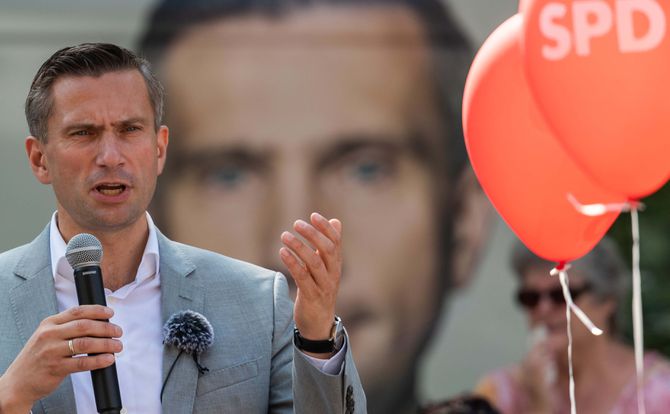Is the German coalition condemned to stay?
Election results in Saxony and Brandenburg show that German coalition parties: the Christian Democrats and the Social Democratic Party are losing ground. Unless voter concerns like migration, safety, and a credible approach against pollution are addressed, both parties will fare poorly in the federal elections.

Elections took place in two of Germany’s states. As strange as it may sound, the results were hailed as a success by both parties forming the federal government coalition in Berlin, the Christian Democrats (CDU) and the Social Democratic Party (SPD).
In Saxony, the CDU has been the strongest party since reunification and has provided the state’s Minister-President since 1990. Although their share of the electorate fell from some 40 percent four years ago to 32 percent, this is hailed as a success, as the Alternative for Germany (AfD), a party labeled as “populist and nationalist” received only 27 percent and did not become the dominant party. The AfD more than doubled its share compared to four years ago and is a strong second. The Social Democrats landed in fifth place with some 8 percent, losing about a third of their already weak results from the last election.
Brandenburg, the state surrounding Berlin, mirrored Saxony. There, the Social Democrats had the lead and managed to maintain it with a small margin. They reached approximately 27 percent, down from 32 percent. The AfD scored 24 percent, falling slightly short of doubling its previous result. Maintaining the pole position was considered a success by the SPD. The CDU, which was second, lost a third of its votes (similarly to the SPD in Saxony) but was at least able to claim third place.
Clear message
The Greens, so successful in Western Germany, had some gains, but remained around 10 percent in both states. The extreme Left, “Die Linke,” which used to be quite strong as the successor of the old Communist party, lost close to half of its share and maintains some 10 percent in both cases.
What is the message from the electorate? It is certainly a rebuke of the two traditionally leading parties. It also shows that the Greens have much less support in the East, where people are widely concerned with reaching the prosperity levels of the more comfortable West. Frustration with the extreme left is understandable, as their record is poor. But aren’t the CDU and the SPD perceived similarly?
The message from the electorate is a rebuke of the two traditionally leading parties.
The negative trend of the two Berlin coalition parties can also be seen in the West, especially for Angela Merkel’s junior partner, the SPD. At the moment the great winners in the former West are not the AfD but the Greens, a left-wing party camouflaged as an ecological one.
Containment strategies
What makes the AfD so successful? A major factor is that they openly address migration and security issues, which many Germans believe the other parties have trivialized. The AfD is not shy to speak out. A further factor – and possibly the main reason for their success – is their total marginalization by the other parties. As with some other elections in Germany, the CDU and SPD campaigns appeared to focus strongly on containing the AfD instead of tackling real concerns and programs.
It is surprising that they continue to use these containment strategies, as they have proven to fail. This only confirms the opinion of the voters that the traditional parties have run out of valid programs addressing the concerns of the people.
It is very clear that the Social Democrats have lost their orientation to represent the interests of workers. The working class is now the new middle class, which actually suffers under overregulation and overtaxation. Similarly, the CDU has moved to the left, and is losing support in the center and the moderate right. Ridiculous discussions on excluding party members who are not considered appropriate anymore, such as a former board member of the Bundesbank by the SPD and the former head of the Verfassungsschutz ( the domestic security agency) by the CDU, do not help. Many have the impression that the coalition is not managing anymore, and is only trying to maintain the status quo.
The CDU and SPD focused on containing the AfD instead of tackling real concerns.
The results of local elections are a bad omen for the two coalition parties, especially the SPD. It will therefore be against the interests of both players to end this coalition. However, unless the two parties go back to the drawing board and reshuffle their programs, they will not be able to avoid disaster in the next federal elections. Merely copying some of the Greens’ ecological policy points, as they are currently doing, will not do the trick. What would be more convincing would be to address clearly burning issues: economic problems (lack of specialized workers, overregulation) instead of blaming trade wars and Brexit, a convincing policy to fight pollution and waste instead of utopian climate targets and an open debate on internal safety and migration as opposed to a feel-good coverage.
The present federal government risks being seen as an administrator of decline. It is surprising that the clear writing on the wall is being ignored. Ms. Merkel has made herself “alternativlos” with her policy and has marginalized strong personalities. The AfD, to the contrary, put the alternative in its name. The coalition parties are now haunted by their own self-satisfied arrogance.
